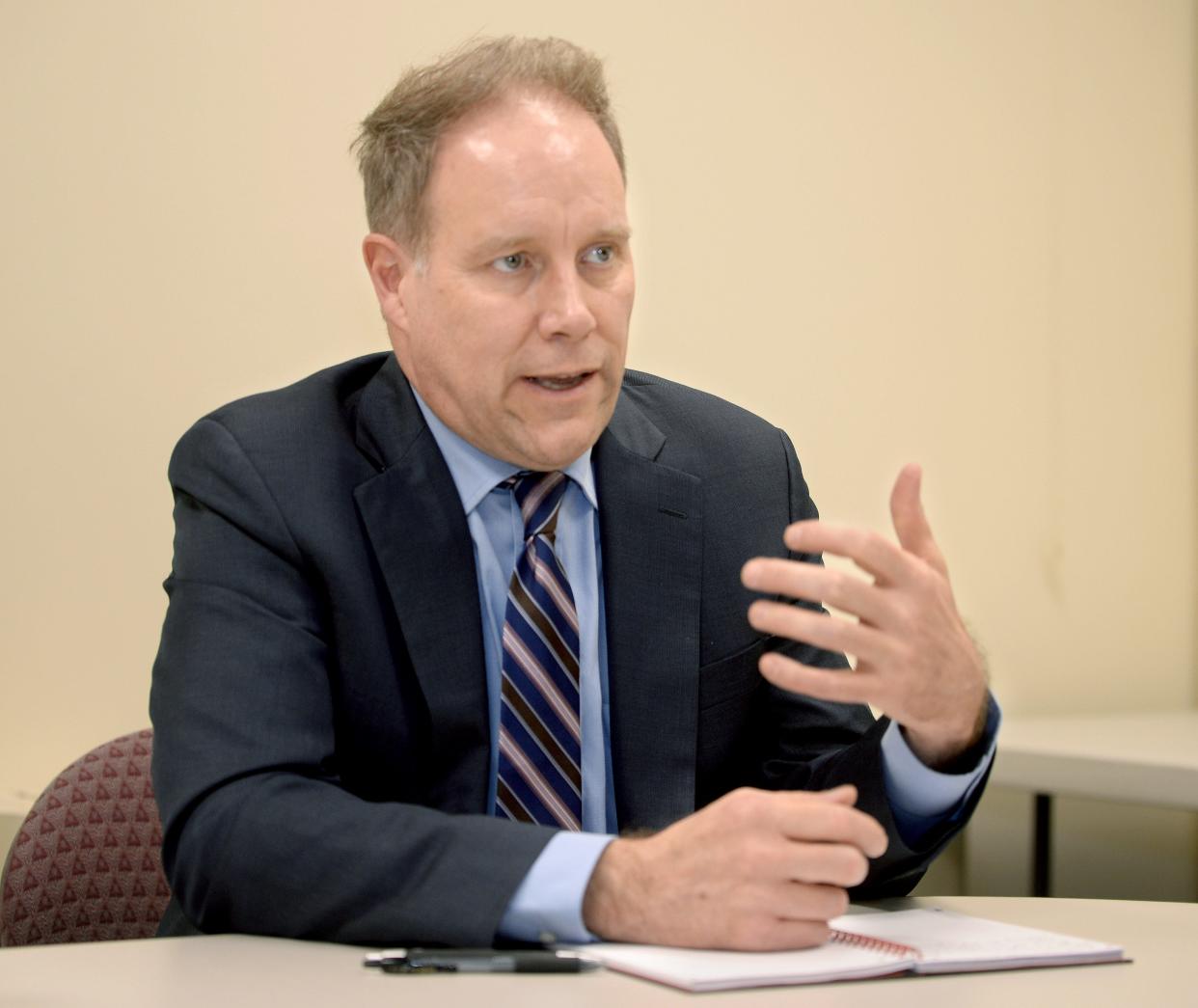As Illinois weighs carbon dioxide pipeline moratorium, feds recommend technology
As state lawmakers weigh carbon capture and sequestration regulations, federal officials are trying to woo support in Illinois — an area they see ripe for investment thanks to its geologic features.
Following visits to Archer Daniels Midland facilities in Decatur and Springfield, U.S. Department of Energy Assistant Secretary Brad Crabtree touched down in the Illinois State Capitol on April 16. The state, he said, plays a major role in helping the Biden administration's goal of net-zero carbon dioxide emissions by 2050.
Carbon capture can help in its aim, Crabtree added, while not hindering manufacturing.

"In-fact, that's fundamental to our prosperity as a country," he told The State Journal-Register. "We have to decarbonize that industrial base in a way that sustains production. And carbon capture is especially well-suited for doing that."
Removing emissions from the atmosphere and into storage wells requires carbon dioxide emissions to first be liquified before traveling via pipeline into underground sequestration sites. Proponents for the process have oft-cited the features of the Illinois Basin making it an ideal location to store it.
Two multi-state pipelines — Wolf Carbon Solutions and Navigator CO2 Ventures — would have done just that. Running through varying counties in central and western Illinois, both however cancelled applications before the Illinois Commerce Commission could issue a decision.
More: Antisemitic incidents in Illinois, US saw sharp increases in 2023, report says
Regulations lacking, environmental groups promote temporary pause
Before that, ICC staff recommended the pipelines be turned down citing public safety concerns. And it is with those concerns that environmental groups and some Democrat and Republican lawmakers support a moratorium on new pipeline projects.
Rep. Ann Williams, D-Chicago, said "regulatory gaps" existing at both the state and federal levels need to be addressed before moving forward. She is in support of the moratorium legislation, House Bill 4835, currently awaiting a full chamber vote in the House in addition to her recently filed bill clarifying pore space ownership.
"We are simply not prepared yet to protect Illinois citizens in the way they need to be protected from the risks of this relatively unproven technology," Williams said during a press conference last week. "With capturing, transporting and injecting fossil fuel pollution, that's a big deal and we need to make sure we get it right."
Pipeline opponents point to a 2020 pipeline burst in Satartia, Mississippi causing over 40 people hospitalizations and more than 200 evacuations as proof of insufficient safeguards and fear of a public health emergency — especially in rural areas lacking well-staffed emergency management squads. A temporary moratorium, they say, is necessary as the U.S. Pipeline and Hazardous Materials Safety Administration crafts updated rules.
Crabtree said the Satartia incident never should have happened, pointing to a lack of training for local EMT responders and improper hazard mitigation strategies. Declining to take a position on a potential moratorium, already in-place in states like California, he did stand by the safety of the approximate 5,300 miles of carbon dioxide pipeline spread throughout the country.
Even with the risk of repeats of Satartia, Crabtree posits the higher risk stands with allowing carbon dioxide to enter the atmosphere.
"I would argue that our electric transmission and distribution infrastructure, it's essential to modern life, but it also results in injuries and fatalities," he said. "But as a result of those risks, we do not have people saying we shouldn't have electric transmission and distribution ... CO2 pipelines are no different in that regard."
A more recent pipeline leak two weeks ago outside of Sulphur, Louisiana causing a shelter-in-place order however was top of mind to Pam Richardt, co-founder of the Coalition to Stop CO2 Pipelines and co-director of the Eco-Justice Collaborative. The temporary order extended a quarter-mile radius outside the town of approximately 21,000 with no hospitalizations or evacuations reported.
No setbacks required by Illinois law, Richardt expressed concern of a pipeline burst near a highly populated area. Williams' legislation, contained in House Bill 5814, would require the Illinois Environmental Protection Agency to establish requirements for determining setbacks near homes, schools, daycares, hospitals and other locations.
"Should developers be able to establish setbacks? I think not," said Richardt.
Business group say moratorium 'doesn’t make sense'
A pipeline moratorium isn't the only carbon capture legislation advancing in Springfield. Business groups such as the Illinois Manufacturers' Association are pushing House Bill 569, also waiting on a vote in the House.
The bill would clarify that the owner of the surface estate would also own the beneath pore space, but would still allow for easements of the property. Securing easements proved to be difficult for the now cancelled Navigator Heartland Greenway — only receiving 13.4% of easements to construct its pipeline. Other lawmakers, including Sen. Steve McClure, R-Springfield, are supporting separate legislation that would prohibit the use of eminent domain to secure lands to build pipelines.
More: Why Pritzker holds 'degree of skepticism' on new carbon capture bill
Local municipalities would also be eligible for grant funding through HB 569, calculated by 1 cent for every ton of carbon dioxide injected into a sequestration facility for each fiscal year. The money could be used to cover emergency response plan expenses along with the purchase of new equipment.
The group backing the legislation, the Capture Jobs Now Coalition, alternatively said a moratorium "simply doesn't make sense."
"We agree that CCS technology must be deployed thoughtfully and carefully, but policymakers must be weary of proposals that would slow progress on greenhouse gas emissions reduction and risk the loss of millions of dollars in investment, and the jobs that come with it," the coalition said in a statement.
Contact Patrick M. Keck: 312-549-9340, pkeck@gannett.com, twitter.com/@pkeckreporter.
This article originally appeared on State Journal-Register: California has moratorium on new CO2 pipelines. Could Illinois follow?
